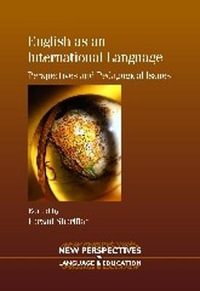Ethnographic fieldwork is something which is often presented as mysterious and inexplicable. How do we know certain things after having done fieldwork? Are we sure we know? And what exactly do we know? This book describes ethnographic fieldwork as the gradual accumulation of knowledge about something you don't know much about. We start from ignorance and gradually move towards knowledge, on the basis of practices for which we have theoretical and methodological motivations. Jan Blommaert and Dong Jie draw on their own experiences as fieldworkers in explaining the complexities of ethnographic fieldwork as a knowledge trajectory. They do so in an easily accessible way that makes these complexities easier to understand and to handle before, during and after fieldwork.
"This immensely accessible and readable book engages the reader from beginning to end in a style which is informal, informative and intellectually fulfilling. Blommaert and Dong offer invaluable practical advice, guiding the reader through the sequences of the ethnographic research process. They successfully illustrate the fundamentals of ethnographic fieldwork, while presenting a set of splendid resources for both the beginner researcher and the experienced ethnographer." Angela Creese, University of Birmingham, UK
"Written in an entertaining and accessible style, this book is a refreshing approach to ethnographic fieldwork. Unlike many other authors who present field research as a set of ready-made recipes to follow, Blommaert and Dong engage their readers in an exciting theoretical and methodological journey into the ethnographic paradigm. This is a must-read for anybody interested in ethnography. "Cecile B. Vigouroux, Simon Fraser University, Canada
Industry Reviews
This immensely accessible and readable book engages the reader from beginning to end in a style which is informal, informative and intellectually fulfilling. Ethnography is presented as a democratic process, open to multiple and layered interpretations, recording uniquely situated realities through specialised analysis. Blommaert and Dong offer invaluable practical advice, guiding the reader through the sequences of the ethnographic research process. They successfully illustrate the fundamentals of ethnographic fieldwork, while presenting a set of splendid resources for both the beginner researcher and the experienced ethnographer. -- Angela Creese, University of Birmingham, UK Written in an entertaining and accessible style, this book is a refreshing approach to ethnographic fieldwork. Unlike many other authors who present field research as a set of ready-made recipes to follow, Blommaert and Dong engage their readers in an exciting theoretical and methodological journey into the ethnographic paradigm. This is a must-read for anybody interested in ethnography. -- Cecile B. Vigouroux, Simon Fraser University, Canada A useful addition to the literature on the methodology of ethnographic fieldwork, this slim...volume covers the nuts and bolts of fieldwork--from how to conduct interviews to what types of data to collect (everything, especially in the beginning)--while rooting best practices in the theoretical foundation of ethnography as analytical science. Summing Up: Recommended. -- M. Cedar Face, Southern Oregon University Choice 48:5 2011 I expect many readers of Ethnographic Fieldwork will wish they had a book like this one prior to their own early experiences in the field, and it will no doubt be of great value to students and others looking for guidance on how to implement ethnographic principles. Though the book doesn't bill itself as a text on linguistic anthropology or sociolinguistics, it is of particular use to those who are interested in the interface of language and culture because of the way it centers language data and linguistically-oriented analysis...The text is highly accessible and easy to read in an afternoon, but it also maintains a richness through illustrative examples drawn from Blommaert's fieldwork in Europe and Africa and Dong's in Beijing. Impressively, there is something for almost everyone in this little book. -- Lal Zimman, Department of Linguistics, University of Colorado at Boulder Linguist List 22.1330
























